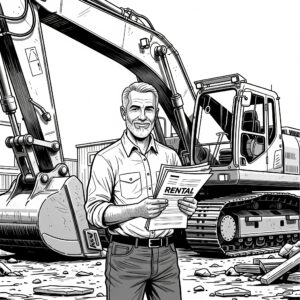Overview
All construction and material handling companies have to ask themselves, “Should we rent, lease, or buy equipment?” This question is more critical now than ever, due to the new financial constraints brought on by COVID-19. Thankfully, many indicators help construction and material handling companies decide which avenue they should pursue. Below are five essential questions to ask while you’re in the decision-making process.
1. What Type of Equipment Do You Need?
The first factor to take into consideration is, “What type of equipment do I need?” When the correct equipment is not being used, your time spent on the job site will be increased unnecessarily. If this happens, your company will lose finances, time, and potentially new job opportunities. In contrast, when the right equipment is used, efficiency is increased overall.
If you have spent time on a construction site, you know that misuse of equipment can happen. With that in mind, properly training and certifying your employees how to operate machinery is vital to your companies protection. If you own a piece of damaged equipment, potentially due to improper usage, you are 100% liable for the damages. However, if you continually rent equipment that gets damaged, your premiums will increase.
2. How Long Will You Need the Equipment?
For many construction and material handling companies, there is a constant influx of different types of jobs. Jobs that only require a machine for a week or month shouldn’t be purchased, only to sit for months afterward. However, if a specific machine is required for an extended amount of time, purchasing a machine rather than renting might be the better option.
Each job has a different set of needs, and each company has unique ways to fulfill those needs. Therefore, every renting, leasing, or buying decision needs to be analytical and intentional. A helpful idea is not to be married to one way of operating. Evaluate every situation with a new financial lens.
3. Can You Safely Store Equipment?
You wouldn’t transport people in your car unless you had enough seat belts for them, right? This concept rings true when dealing with heavy machinery. It would be best not to buy heavy equipment unless you can store it in a safe and secure environment because theft is the most common equipment loss. Unfortunately, spending additional funds on safety measures such as buildings or fences can become costly.
On the other hand, if you already have access to things like buildings, private property, or 24/7 security, the burden to protect your machines becomes less. Every construction or material handling company has different resources available to them, and decisions must be made accordingly.
4. Financing vs. Rental Rates?
No one enjoys paying for something that they don’t get to keep and use. So, the logical conclusion would say then to avoid renting heavy equipment. However, companies need to evaluate the stage of their business. Much like moving into an apartment as a freshman in college, smaller enterprises should most likely begin operating in the renting realm to save money. Once your business matures, and steady cash flow is established, buying and reducing rental costs could be most beneficial.
5. What to do with Depreciation?
Construction and material handling equipment industry is not immune to the fast-paced changes in this technological age. Physical depreciation and depreciation due to technological advances are both enemies of purchasing heavy equipment. Altorfer CAT, a new and rental equipment provider, says that, on average, equipment depreciates between 20-40% within a year after purchase.
For instance, the typical actual cash value (ACV) of a $20K forklift after the first of use is $13K. However, the depreciation rate after the first year will become more stable. Depreciation is a downside to purchasing new equipment; however, it can be a better option, for some companies.
The Constructor, a reputable resource for many construction companies, has built a system for calculating depreciation over time. If you would like to utilize that system, it is available free on their website. If you would like to learn their thoughts about renting, leasing, and buying equipment, check out their blog post.
For more industry insights, subscribe to the JT Bates Group blog, or click here to read other Equipment Industry Blogs!




